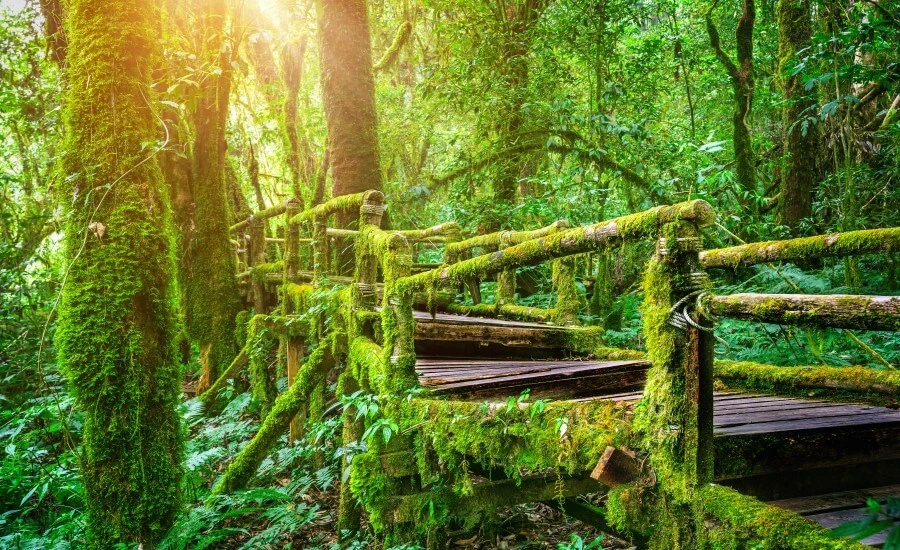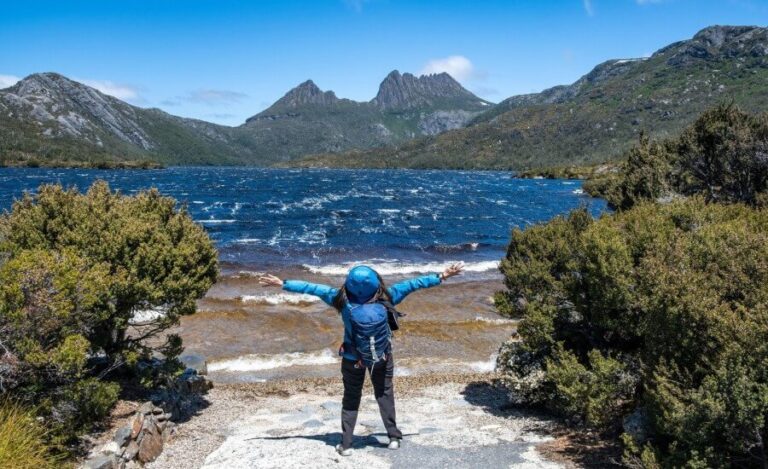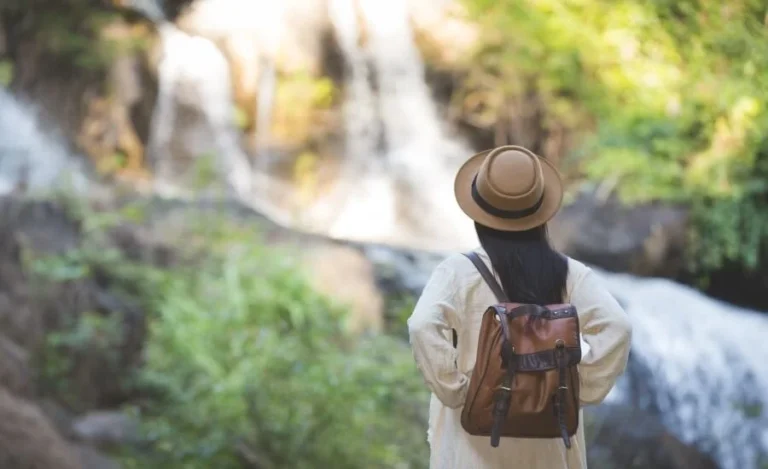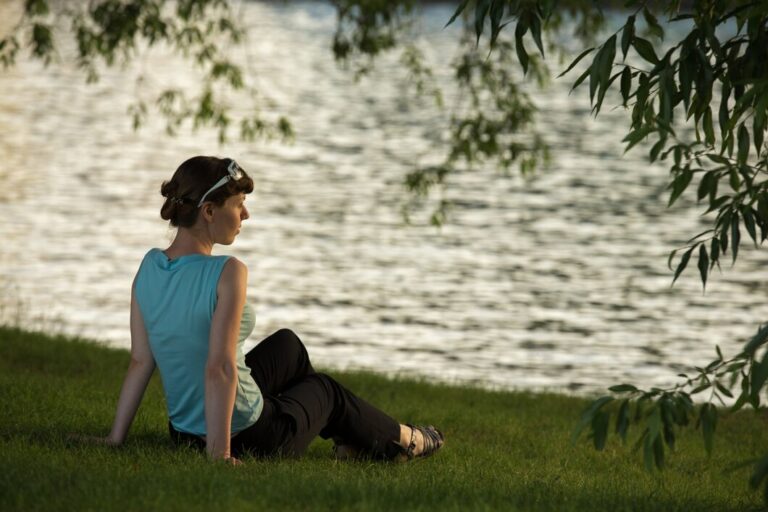
Step off the weathered longboat, or perhaps just off the defined path, and the world transforms. The air grows thick, heavy with moisture you can practically taste. A cacophony of unseen insects buzzes, clicks, and whirs, a constant orchestral backdrop to the piercing calls of exotic birds. Shades of green you never knew existed layer upon layer, from the mossy forest floor to the towering canopy high above, filtering the tropical sun into dappled patterns. This isn’t just stepping into a forest; it’s entering an ancient realm, a vibrant, living system – the heart of Borneo’s rainforest.
Borneo, the third-largest island on Earth, shared by Malaysia (Sabah and Sarawak), Indonesia (Kalimantan), and Brunei, harbours some of the planet’s oldest and most biodiverse rainforests. These emerald jewels teem with unique life forms, many found nowhere else. But these precious ecosystems face unprecedented threats.
An Eco Trek in Borneo offers more than just a “Rainforests Adventure“; it’s a chance to witness this natural wonderland responsibly, to connect deeply with nature, and to contribute, even in a small way, to its conservation. This post will guide you through the wonders of Borneo’s jungles, the principles of ethical trekking, potential destinations, and the practicalities of planning your own immersive, conservation-conscious journey.
Borneo’s Emerald Jewel: A World of Unrivaled Biodiversity

The rainforests of Borneo are biological treasure troves. They are home to an estimated 15,000 species of flowering plants (around 6,000 of which are endemic, found only here), boasting more tree diversity in a few acres than in all of North America combined. This incredible floral richness supports an equally astounding array of animal life. Over 230 mammal species (including 44 endemics like the Bornean pygmy elephant), 420 resident bird species (37 endemic, including various spectacular hornbills), hundreds of reptile, amphibian, and fish species, and an untold number of insects call this island home.
Borneo is perhaps most famous for its primates, particularly the critically endangered Bornean orangutan, our serene, orange-haired relative dwelling in the treetops. Encounters with the comical proboscis monkey, with its distinctive large nose, are a highlight of river trips.
Gibbons gibber through the canopy, while macaques and langurs are common sights. Elusive creatures like the clouded leopard and the sun bear also roam these forests, though sightings are rare. This staggering biodiversity underscores Borneo’s critical role as a global conservation priority. However, these ancient ecosystems are under severe pressure.
Rampant deforestation, driven primarily by logging (both legal and illegal) and the relentless expansion of palm oil plantations, has fragmented habitats and pushed countless species towards extinction. Peat swamp forests, vital carbon sinks, have been drained and burned, releasing massive amounts of CO2 and causing devastating haze. Choosing an eco-trek is choosing to support a different future for this precious island.
Iconic Borneo Wildlife:
- Bornean Orangutan (Critically Endangered)
- Proboscis Monkey (Endangered)
- Bornean Pygmy Elephant
- Sun Bear (Vulnerable)
- Various Hornbill species
- Müller’s Bornean Gibbon (Endangered)
- Clouded Leopard (Vulnerable)
The Path Less Harmful: Principles of Responsible Eco-Trekking

An “Eco Trek” is fundamentally about minimizing negative impacts and maximizing positive contributions – to the environment, wildlife, and local communities. It requires conscious choices before, during, and after your trip. The single most important decision is choosing an ethical tour operator and guide. Look for companies that:
- Employ local, licensed guides: This ensures expert knowledge and fair economic benefits for the community.
- Adhere to strict wildlife viewing protocols: Maintaining distance, prohibiting feeding or touching, limiting viewing times.
- Operate with small group sizes: Minimizes disturbance to wildlife and the environment.
- Demonstrate tangible contributions to conservation: Partnering with NGOs, funding habitat restoration, or supporting anti-poaching efforts.
- Practice responsible waste management: Packing out all rubbish, using sustainable supplies.
- Have clear environmental policies: Transparent about their efforts to reduce their footprint.
- Are certified or accredited: By reputable eco-tourism bodies (though certification isn’t always available or the only indicator).
Reading reviews and asking direct questions about their practices is crucial. Once on the trail, your behavior matters immensely.
Responsible Rainforest Trekking Code:
- Stay on Marked Trails: Avoid damaging fragile vegetation and getting lost.
- Maintain Distance from Wildlife: At least 10 meters (30 feet) is often recommended, especially for primates. Never surround animals.
- NEVER Feed or Touch Wildlife: This habituates animals, alters natural behavior, spreads disease (in both directions!), and can lead to aggression.
- Keep Noise to a Minimum: Loud talking disturbs wildlife and detracts from the experience for everyone. Move quietly and slowly for better sightings.
- Leave No Trace: Pack out everything you bring in, including organic waste like fruit peels. Use biodegradable soap/toiletries sparingly and away from water sources. Follow proper human waste disposal methods if camping (catholes).
- Don’t Take Souvenirs: Leave plants, seeds, rocks, and feathers where they belong.
- Respect Local Culture: If visiting communities, dress modestly and follow local customs. Ask permission before taking photos.
- No Smoking Near Wildlife: Protect animals from secondhand smoke and potential fire risks.
- Follow Your Guide: They are trained for safety and responsible conduct. Listen to their instructions carefully.
Your Eco Trek in Borneo: Where & How to Experience the Adventure

Borneo offers diverse regions for responsible rainforest exploration. Your choice depends on interests, fitness, and desired comfort level. Always opt for tours led by licensed, reputable guides.
- Danum Valley Conservation Area (Sabah, Malaysia): A jewel of primary lowland rainforest, largely untouched by human settlement prior to conservation. Renowned for research and biodiversity, including orangutans, gibbons, pygmy elephants, and incredible birdlife. Offers guided treks (day and night), canopy walkways, and stays at specialized lodges like the Borneo Rainforest Lodge or the more research-oriented Danum Valley Field Centre. Expect higher costs but unparalleled pristine forest experience.
- Kinabatangan River (Sabah, Malaysia): Offers a different perspective, focusing on river safaris. Excellent for easily spotting wildlife concentrated along the riverbanks, including proboscis monkeys, orangutans (often seen nesting), pygmy elephants (seasonal), crocodiles, macaques, and diverse birdlife. Accommodation is typically in riverside lodges offering guided boat trips (dawn and dusk are best) and some shorter guided walks. Accessible from Sandakan.
- Bako National Park (Sarawak, Malaysia): Accessible via a short boat ride from Kuching, Bako offers incredible ecosystem diversity in a compact area – mangrove forests, dipterocarp forests, cliff vegetation, and stunning coastal scenery with sea stacks. Known for proboscis monkeys, silvered langurs, long-tailed macaques, bearded pigs, and diverse plant life including pitcher plants. Features an extensive network of marked trails for day hikes of varying difficulty. Basic park accommodation is available for overnight stays.
- Tanjung Puting National Park (Kalimantan, Indonesia): Famous for its orangutan rehabilitation work pioneered by Dr. Birutė Galdikas at Camp Leakey. Typically explored via multi-day klotok (houseboat) trips upriver, visiting feeding stations. While offering close orangutan views, it’s crucial to research current accessibility, operator ethics, and potential overcrowding concerns to ensure a responsible visit. Focus is heavily on orangutans.
- Other Areas: Places like Batang Ai National Park (Sarawak) offer experiences involving indigenous Iban communities and wild orangutan trekking. Gunung Mulu National Park (Sarawak) is famous for its vast cave systems and pinnacles trek.
Experiences range from comfortable lodge-based stays with guided excursions to multi-day, physically demanding deep-jungle treks involving basic camping or shelter stays.
Jungle Immersion: Embracing the Adventure & Disconnecting

An Eco Trek in Borneo is a full sensory immersion. Be prepared for the physical challenge: the constant humidity that leaves you perpetually damp, the uneven trails slick with mud and tangled with roots, the occasional river crossing, and the demanding climbs. Leeches and insects are part of the ecosystem; proper preparation (leech socks, repellent) makes them manageable annoyances rather than major obstacles. Yet, the rewards far outweigh the discomforts.
There’s an incredible sense of accomplishment in navigating this challenging environment. More profoundly, the jungle demands presence. With limited or no phone signal or Wi-Fi, you are naturally disconnected from the digital world. Your focus shifts to the immediate: placing your feet carefully, listening for the rustle in the undergrowth that might signal wildlife, scanning the canopy for movement, absorbing the sheer overwhelming vitality around you.
This forced digital detox combined with intense physical and sensory engagement is incredibly grounding and mentally restorative. It fosters resilience, sharpens awareness, and cultivates a deep appreciation for the intricate web of life you are temporarily a part of. In the absence of digital noise, what whispers from the ancient forest, and from within yourself, might you finally hear?
Beyond the Trek: Conservation & Community

Choosing a responsible Eco Trek in Borneo means your adventure actively contributes to protecting this vital ecosystem. Reputable eco-tourism provides a sustainable economic alternative to destructive industries like logging and unsustainable agriculture for local communities. When operators employ local guides, purchase supplies locally, and support community-run initiatives (like homestays or handicraft sales), your tourism money directly benefits the people who are the forest’s traditional custodians.
Furthermore, park entrance fees and levies charged by ethical tour operators often directly fund conservation efforts. This can include supporting park management, funding anti-poaching patrols, investing in habitat restoration and reforestation projects, and financing wildlife rescue and rehabilitation centers (like Sepilok).
Responsible tourist presence can also act as a deterrent to illegal activities. By choosing wisely, you become more than just a visitor; you become a stakeholder in the preservation of Borneo’s natural heritage, demonstrating that intact rainforests and thriving wildlife have tangible economic value. Your journey becomes a small but meaningful investment in the future of this emerald jewel.
Common Concerns & Solutions for Borneo Rainforest Trekking

Venturing into the Borneo rainforest requires awareness and preparation. Here’s how to address common concerns:
- Concern: Safety (Wildlife, Terrain, Getting Lost)?
- Solution: Serious wildlife threats are rare when with experienced guides who know how to avoid or handle encounters safely. Respect wildlife and maintain distance. Terrain requires sturdy footwear and vigilance. Never trek alone; always go with a licensed guide to navigate safely and avoid getting lost. Inform guides of any medical conditions.
- Concern: Health Risks (Insects, Leeches, Disease)?
- Solution: Leeches are common but harmless; wear leech socks and long trousers tucked in. Use DEET-based insect repellent to protect against bites (mosquitoes can carry dengue, malaria risk varies – see below). Maintain good hygiene. Drink only treated/bottled water. Consult a travel clinic 4-6 weeks before your trip about recommended vaccinations (Tetanus, Typhoid, Hep A standard; others like Hep B, Rabies, Japanese Encephalitis depend on duration/activities) and malaria prophylaxis (risk is low in main tourist areas but higher in deep jungle/remote regions – discuss your specific itinerary with your doctor).
- Concern: Physical Difficulty & Climate?
- Solution: Be honest about your fitness level when choosing a trek; options range from easy walks to strenuous multi-day expeditions. Train beforehand (hiking, cardio). The heat and humidity are intense; acclimatize if possible, stay hydrated, wear lightweight quick-drying clothes, and pace yourself.
- Concern: Finding Ethical & Reputable Operators?
- Solution: Do thorough research online. Look for certifications, detailed responsible tourism policies, positive reviews focusing on ethics (not just wildlife sightings), partnerships with conservation groups. Contact operators directly and ask specific questions about guide training, group sizes, and wildlife interaction policies. Be wary of suspiciously cheap tours or guarantees of touching wildlife.
- Concern: Cost?
- Solution: Responsible eco-tours often cost more due to fair wages for guides, conservation contributions, permit fees, and sustainable practices. See it as investing in a quality, ethical experience and supporting conservation, rather than just paying for a basic service. Budget accordingly.
Before You Go: Your Borneo Rainforest Eco Trek Checklist

Proper preparation is vital for a safe, comfortable, and responsible Borneo eco-trek.
- Health Consultation: Visit a travel clinic/GP 4-6 weeks prior. Discuss vaccinations, malaria prevention strategy based on your itinerary, and get necessary prescriptions. Pack a personal first-aid kit with additions for jungle conditions (antiseptic wipes, blister treatment, antihistamines, pain relievers).
- Choose Your Operator Wisely: Research and book with a reputable, licensed eco-tour operator whose practices align with responsible tourism principles. Confirm itinerary, inclusions, and guide qualifications.
- Fitness Preparation: Engage in regular cardiovascular exercise and hiking (ideally on uneven terrain) in the months leading up to your trip. Break in your hiking boots thoroughly.
- Essential Packing:
- Clothing: Lightweight, quick-drying long-sleeved shirts and trousers (protection from sun, scratches, insects). Moisture-wicking base layers. Rain jacket/poncho. Swimsuit (if applicable).
- Footwear: Well broken-in waterproof hiking boots with good grip. Camp shoes/sandals. Leech socks are highly recommended.
- Gear: Comfortable backpack, waterproof dry bags (essential for electronics/clothes), headlamp/torch with spare batteries, water bottle(s) and water filter/purification tablets, high-DEET insect repellent, sunscreen, hat, sunglasses.
- Optional: Binoculars, camera with extra batteries/memory cards, waterproof phone case, basic toiletries (biodegradable preferred), small quick-dry towel, field guide for wildlife/plants, waterproof notebook/pen.
- Permits & Fees: Ensure your tour operator arranges necessary park permits and conservation fees, or understand how to obtain them yourself if traveling independently (rarely advised for deep jungle treks).
- Travel Insurance: Absolutely essential. Ensure it covers adventure activities like jungle trekking and includes emergency medical evacuation from remote areas.
- Mental Preparation: Be ready for heat, humidity, insects, leeches, basic facilities (on some treks), and limited contact with the outside world. Embrace the challenge and the opportunity to disconnect.
- Learn: Read about Borneo’s ecosystem, wildlife, and conservation challenges beforehand. This enhances appreciation and understanding during your trek.
Conclusion: An Unforgettable Journey into the Wild Heart

An Eco Trek in Borneo is far more than just a walk in the woods. It’s an expedition into one of the planet’s most vital and vibrant ecosystems, a journey that challenges the body, stimulates the senses, and touches the soul. It’s an opportunity to witness evolutionary marvels like the orangutan in its natural realm, to feel the ancient pulse of the rainforest, and to gain a visceral understanding of what’s at stake in the face of deforestation.
By choosing to tread lightly, support ethical operators, and engage respectfully, your adventure becomes part of the solution, contributing to the conservation of this irreplaceable biodiversity and the well-being of local communities.
The humidity, the leeches, the strenuous paths – they fade against the backdrop of awe-inspiring nature and the deep satisfaction of responsible exploration. You’ll leave Borneo not just with incredible memories and photographs, but with a profound connection to the wild heart of the planet and a renewed commitment to protecting it.
Are you ready to answer the call of the wild responsibly? Start researching, choose your path wisely, and prepare for an adventure that promises not just excitement, but transformation. Borneo’s rainforest awaits.






